Whether you are a new homeowner buying an HVAC system for the first time or a seasoned homeowner who wants to replace their HVAC system with a new one, there are many things to consider before making this big investment.
Since it’s probably the most impactful appliance in your home, you should be aware of all the facts regarding the different kinds of equipment that come with it. An air conditioner or a heater provides thermal comfort to your home, and ventilation improves indoor air quality.
The comfort of your home and your family’s physical well-being is related to the efficiency of the HVAC installed. Hence, it is essential to be informed and choose wisely.
If you are looking for a new HVAC to invest in or wondering if it is better to repair, this guide will help you decide what is best for you.
Table of Contents
Repair or Replace?
Before you conclude that you need a new HVAC, it is best to be sure that your old one cannot be repaired. Many homeowners struggle with making the right choices when it comes to faulty equipment.
Let’s say your air conditioner has broken. We have come up with four criteria to help you decide whether to toss it out or get it fixed.
If the appliance’s age has exceeded 10-12 years, there is no point in resuscitating it since it would only require frequent maintenance. As more consistent maintenance is needed, costs of repair increase. Lastly, faulty equipment results in spikes in energy bills.
If you are facing any of these issues, you should consider replacing your appliance. Otherwise, contact an HVAC contractor for a professional air conditioner repair.
If you have decided to buy a new HVAC, there are some things that you need to keep in mind before making the purchase. The best way to go would be to contact a professional HVAC contractor and let him guide you. Here are some things to consider:
Size – Fits Your Home!
Getting an HVAC unit appropriate for the size of your home determines how well it would work. Incorrect sizes of the unit can lead to wear and tear of the system and requires greater maintenance.
If you buy an undersized HVAC, there would be inadequate heating or cooling, which defeats the purpose of providing you comfort. An oversized HVAC would result in decreased efficiency and more energy consumption.
Capacity – Power of the Unit!
Another important parameter to consider is the capacity of an HVAC system. Heating system capacity is measured in British Thermal Units (BTU), while cooling system capacity is measured in tons.
Generally, a system with a greater BTU rating has greater heating capacity. A system with less power won’t adequately heat or cool your home, and a system with more power than needed will result in wasted energy.
Ideal capacity is chosen based on the size of the home, insulation, the height of the ceiling, and climate.
Energy Rating = Better Efficiency
HVAC systems are not a one-time investment; they require maintenance and use energy to function. To save both energy and money, it is important to check the energy efficiency of the unit.
There are different parameters for measuring the energy consumption of your HVAC. A Seasonal Energy Efficiency Ratio determines the efficiency of air conditions. Similarly, Annual Fuel Utilization Efficiency (AFUE) measures the efficiency of furnaces and Heating Seasonal Performance Factor (HSPF) of heat pumps.
Getting an HVAC system with higher efficiency would result in reduced energy consumption, an increase in financial savings, and a depletion of resources.
It is important to note these ratings because of the impact it has on your monthly energy bill, carbon footprint. A better rating means lesser maintenance and more cost savings.
Maintenance – An Upkeep Plan!
In order to operate efficiently, all HVAC systems require some degree of maintenance. Some units require more maintenance than others. If you want your unit to have a long life span, it is crucial to fulfilling its maintenance requirements as indicated by the contractor.
Poorly kept systems exhibit operational issues, so it’s best to invest in a system that requires minimal interventions. If you are too lazy or busy to consider signing up for an HVAC maintenance plan.
Buying an HVAC is a huge investment and requires a lot of thought. While it takes a lot of work, finding a system that works for you will ensure years of consistent comfort that will make your house a better home.
Tags: capacity of an HVAC system, HVAC maintenance plan, HVAC System, professional air conditioner repair




